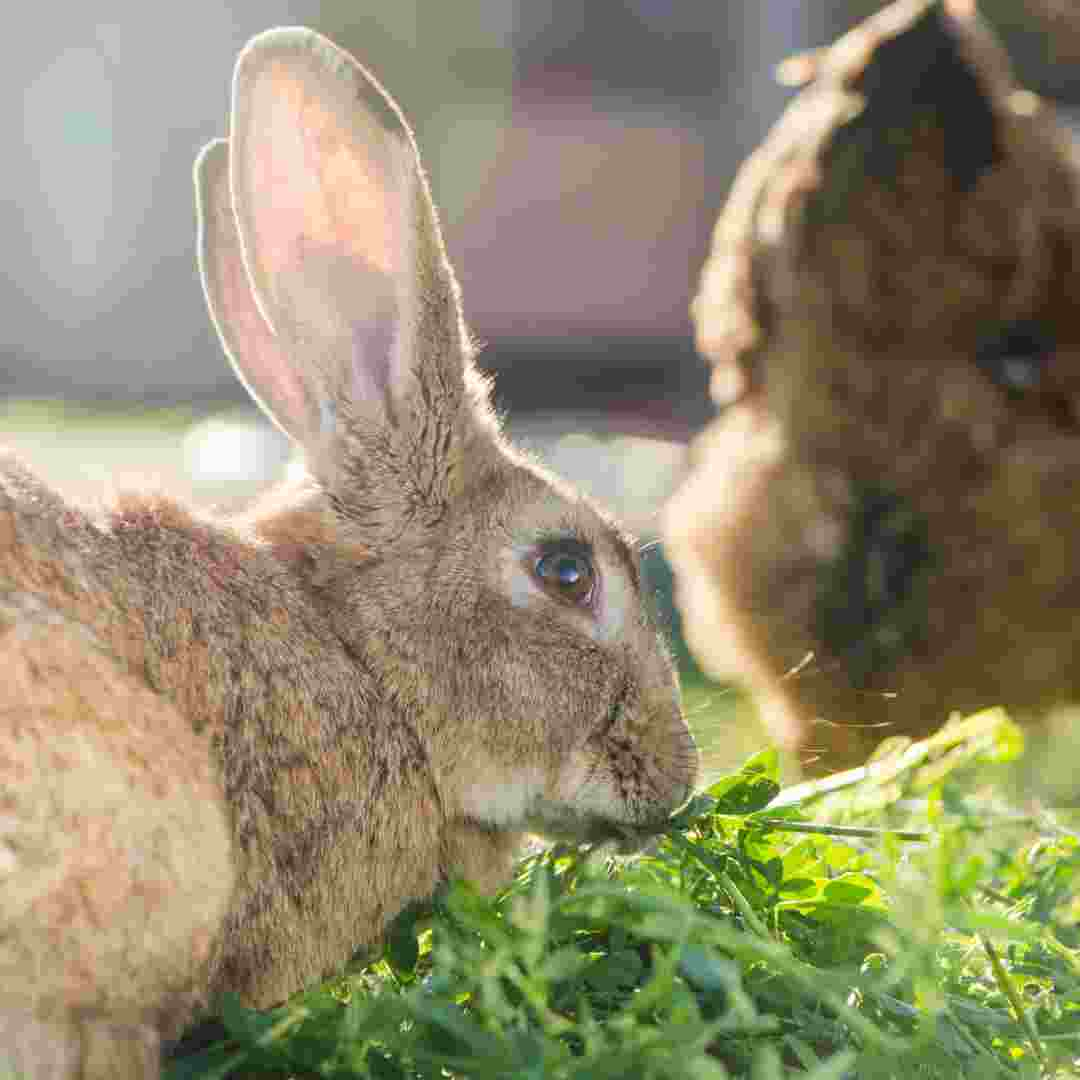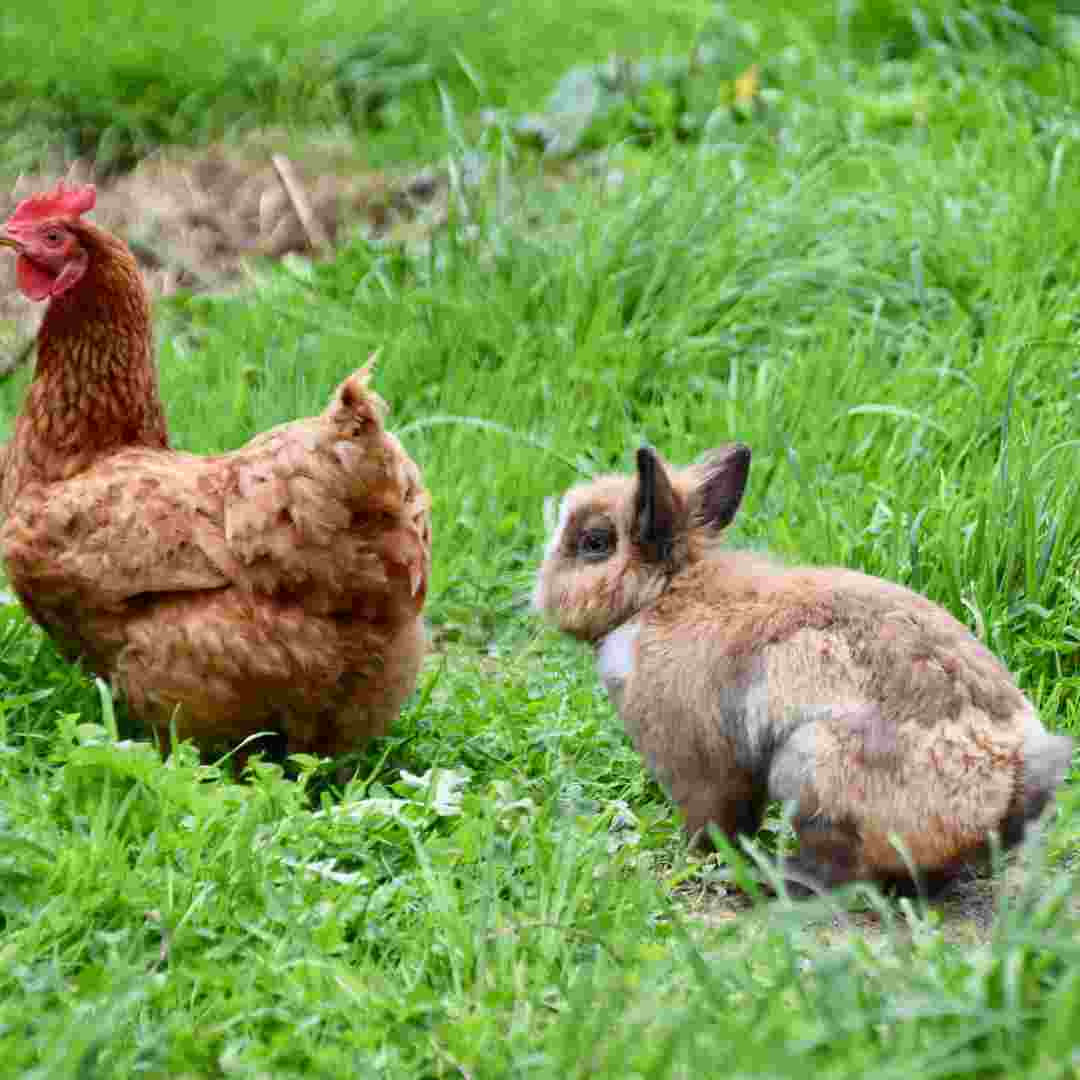Contents Table
Introduction
Keeping Rabbits and Chickens Together: Pros and Cons
How to Safeguard and Comfort Rabbits and Chickens
Considerations Before Introducing Rabbits and Chickens
Monitor Rabbit and Chicken Health When Kept Together
Tips for Feeding Rabbits and Chickens Together
Q&A
Conclusion
Introduction
Rabbits and hens are fantastic pets, but safety should be considered first. Understanding the hazards and benefits of raising rabbits and chickens together is crucial since they have different demands and behaviours. This article will examine the pros and cons of housing rabbits and chickens together and how to safely introduce them.
https://youtu.be/r8FgVbq2kYQ?si=jvFCfcfHs6NpWmIv
Keeping Rabbits and Chickens Together: Pros and Cons
Keeping rabbits and chickens together can benefit both species, but weigh the pros and cons first.
Pros
The main benefit of having rabbits and chickens together is company. Social animals like rabbits and chickens build strong ties. It can relieve stress and boredom in both species. Rabbits and chicks can also protect one other from predators. Chickens warn rabbits of danger, while rabbits protect chickens from predators.
Other benefits of having rabbits and hens together include cleaning each other. Chickens groom rabbits, while rabbits clean chicken feathers. This can cut grooming and cleaning time.
Cons
The fact that rabbits and chickens can share diseases is a major negative. Both chickens and bunnies can spread infections that harm each other. Before meeting, make sure both animals are healthy.
Rabbit aggression by hens is another concern. Rabbits can be injured or killed by chicken pecks. The animals must be regularly monitored to ensure they get along.
Finally, rabbits and chickens eat differently. Rabbits need fibre, chickens protein. Both animals need proper diet.
In conclusion, keeping rabbits and hens together can be enjoyable, but weigh the pros and cons beforehand. Both animals must be healthy, fed, and monitored to ensure they get along.
How to Safeguard and Comfort Rabbits and Chickens
Rabbits and chickens need a safe and comfortable habitat to stay healthy. Here are some ways to keep your pets safe and comfortable.
1. Enclose securely. Rabbits and hens need a safe enclosure from predators. Keep the enclosure large enough for them to move and secure with a door or gate.
2. Make home comfy. Draft-free and temperature-controlled housing is essential for rabbits and hens. The enclosure should be well-ventilated and have straw or hay bedding.
3. Feed safely and nutritiously. A balanced diet for rabbits and chickens includes fresh veggies, hay, and a little pellets. Always supply clean, fresh water.
4. Offer several enrichment activities. To stay cognitively and physically active, rabbits and chickens need enrichment. Give them toys, tunnels, and other playthings.
5. Provide regular vet care. Animal health depends on regular veterinary treatment. Visit the vet regularly for checkups and immunisations.
By following these suggestions, you can keep rabbits and chickens safe and comfortable. This will keep them healthy and happy for years.
Considerations Before Introducing Rabbits and Chickens
When introducing rabbits and hens, various aspects must be considered.
First, make sure the bunnies and hens are healthy and disease-free. To avoid damage and bullying, rabbits and chickens should be similar in size and age.
Second, the rabbits and chickens' surroundings is crucial. The enclosure should be large enough for both species and have lots of hiding spots and shade. Chickens and bunnies can escape, therefore the enclosure must be secure.
Third, both species' diets matter. Both rabbits and chickens need a balanced diet because they have distinct nutritional needs. Chickens can readily get to rabbit food, therefore it's necessary to store it securely.
Finally, both species' temperaments matter. Slowly introducing rabbits and hens is necessary since they are territorial. Since rabbits can attack chickens and vice versa, it's crucial to watch their interactions.
You can keep rabbits and hens safe and comfortable by considering these elements.
Monitor Rabbit and Chicken Health When Kept Together
Keeping rabbits and chickens together requires health monitoring to ensure their safety. Here are some animal health monitoring tips:
1. Monitor their behaviour: Make sure your animals are interacting well. If animals show aggressiveness or bullying, separate them immediately.
2. Check for signs of illness: Look for sneezing, coughing, or eye or nose discharge. Contact your vet immediately if you detect these symptoms.
3. Monitor their diet: Feed your animals a balanced, species-appropriate food. Check the label to be sure commercial feed is for rabbits and chickens.
4. Give your animals space to roam and explore. In small spaces, they may grow anxious or aggressive.
5. Clean their environment regularly to minimise disease transmission. Replace filthy bedding with new.
These recommendations will help your rabbits and chickens stay healthy and safe together. Contact your vet immediately if you have animal health concerns.
Tips for Feeding Rabbits and Chickens Together
1. Provide separate food spaces: Housing rabbits and chickens together requires separate feeding facilities. This will prevent chickens from eating rabbit chow and vice versa.
2. Feed the hens first while feeding both animals. This will prevent chickens from eating rabbit food.
3. Feed both animals a range of foods. Hay, fresh veggies, and a little pellets are good for rabbits. Feed chickens grains, veggies, and mealworms for a balanced diet.
4. Monitor animal food intake: Both animals must be monitored. This will help animals obtain enough nutrients and not overeat.
5. Clean up food crumbs: Both animals leave food scraps. This prevents sickness and keeps the region clean.
6. Give both animals new water. This will help them keep hydrated and healthy.

Q&A
1. Can rabbits and chickens coexist?
Keeping rabbits and hens together is not advised. Rabbits and hens consume different foods and can transfer diseases. Chickens may also attack bunnies.
2. Are there risks to keeping rabbits and hens together?
Keeping rabbits and chickens together might spread diseases, chickens may attack rabbits, and they have different diets.
3. How do I maintain rabbits and hens together?
Keeping rabbits and hens together requires safety precautions. This includes housing the animals apart, providing alternate food sources, and regularly monitoring them for hostility or disease.
4. Can rabbits and chickens share a cage?
No, rabbits and chickens should not share an enclosure. Rabbits and hens consume different foods and can transfer diseases. Chickens may also attack bunnies.
5. What should I do if hens attack rabbits?
If your chickens are assaulting your bunnies, separate them immediately. You should also give the animals separate housing, food sources, and watch for hostility or disease.
Conclusion
Due to disease transmission and animal harm, rabbits and chickens should not be kept together. Rabbits and chickens need distinct diets and living conditions, thus they should be kept apart. Keeping them together requires regular monitoring and appropriate room and enrichment for both species.
